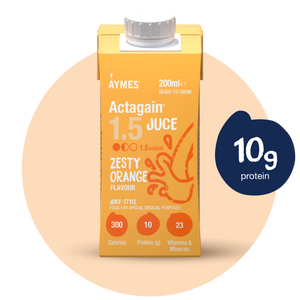
Oral nutritional supplements (ONS) can be used in children who are at risk of or who have faltering growth and are often used alongside dietary changes and counselling.1 ONS, however, are only effective in managing malnutrition if they are consumed as advised and there are several key factors which can impact compliance. There are also additional challenges to consider when it comes working with children including Picky Eating and Avoidant Restrictive Food Intake Disorder, both of which can benefit from appropriate use of ONS. 2,3
What can impact ONS compliance?
Flavour and palatability:
Sensory aspects of ONS play a major role in the perception of a product and overall opinion is considerably impacted by the taste.4 Flavour perception starts to develop before we are even born, and generally younger children prefer sweeter flavours.5 As children develop into teenagers, taste preferences mature and a wider range of flavours are accepted,6 meaning that a variety ONS should be considered for different age ranges. Taste changes are also common during disease treatments and product acceptability may change during this time.7
Taste fatigue:
ONS are often prescribed in the short term, however, some children may require them for longer periods of time (e.g. those with chronic conditions such as cystic fibrosis). Taste fatigue can occur when ONS are frequently consumed over a long period of time,8 highlighting the need for a variety of flavours and types of ONS when it comes to choosing appropriate products.9
Ready to drink versus powder ONS:
Much of the compliance data available is in adult populations and are based on ready to drink formulations. Anecdotally, powdered products have also been reported to be less convenient.10 A paediatric-specific study, however, found that fresh milk-based supplements were preferred in comparison to pre-prepared products.11 The format of a nutritional supplement should, therefore, be considered to support its intended use and this may vary depending on the age of the child
Volume:
Research suggests that younger children (between 1-12 years old) requiring nutrition support are more compliant with energy-dense, low-volume products in comparison with standard ONS.1 This suggests that compact-style or split dose ONS may be more suitable in this age group. It is important to remember, however, that these preferences may change as children progress into their teenage years.
Top tips for improving compliance:
- Offer a wide variety of flavours – remember different age groups may have preferences for certain types of flavours.
- Offer a variety of styles of ONS. A mix-and-match approach may help combat taste fatigue and different volumes may be more appropriate for different age groups.
- Consider whether a ready to drink or powdered option is most suitable – this may vary depending on the situation. If a younger child requires ONS whilst at school a pre-prepared supplement may be more convenient, whereas a powdered ONS may be more suitable for an older child who is able to make the supplement up independently.
- Be creative with how ONS are served. Most drinks can be served chilled in a cup or a glass and some can even be frozen into ice lollies. Neutral flavoured powdered ONS can also be used to fortify everyday meals and recipes.
- Consider using adult ONS when appropriate. A wide range of adult ONS are suitable for use in children and these can be used to increase variety and flavour availability for those struggling with compliance. Always remember to assess micronutrient provision if considering an adult product for children.
















